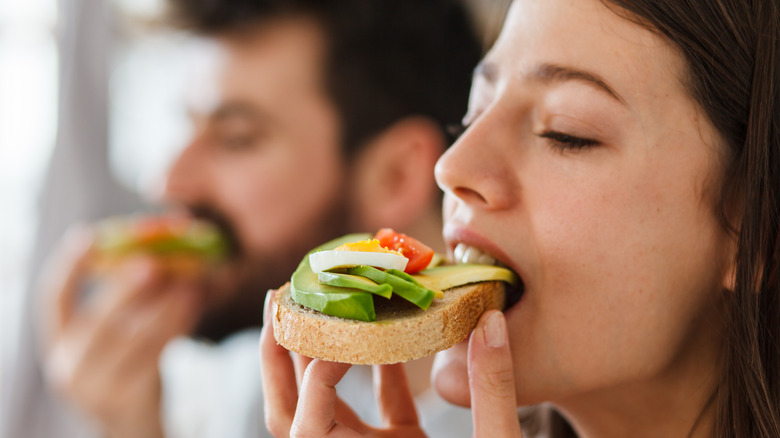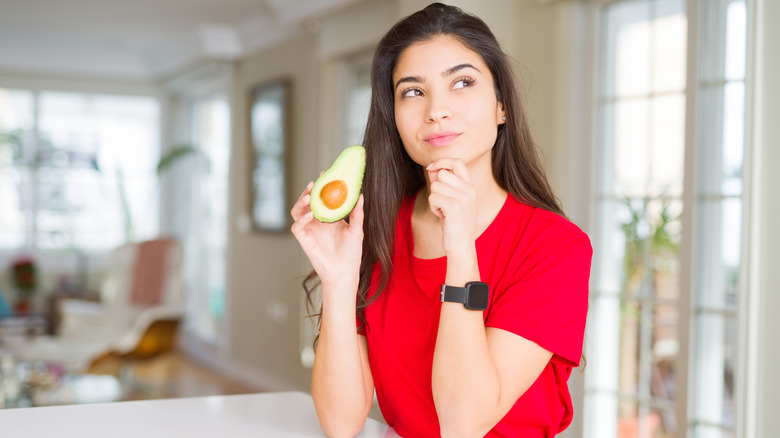Avoid Eating Avocado If You Have This Little-Known Food Intolerance
On the whole, there's a lot to love about the avocado. It's filled with healthy fats and, as Healthline explains, packed with nutrients like vitamins E, C, and K. Plus, it's essential if you're craving authentically prepared guacamole. But if you experience symptoms like trouble breathing after indulging in avocados, you might want to stay away from the popular vegetable. As it turns out, avocados can trigger allergies in people with an intolerance to histamine because avocados are a high-histamine food.
Never heard of histamine intolerance? WebMD notes that people who have a histamine intolerance can't effectively process histamine that's introduced into the body. Over time, their histamine levels start to rise, which increases their chances of experiencing side effects ranging from common cold symptoms and tiredness to gastrointestinal reactions.
Here's the interesting thing, though: Many people don't make the connection between their symptoms and histamine intolerance. After all, the symptoms of histamine intolerance mirror those of many other conditions. This makes the condition challenging to diagnose and treat. Accordingly, the Cleveland Clinic reports that just 1% of people in the U.S. have been diagnosed with histamine intolerance but that the actual incidence rate may be higher.
How can you know if you may have histamine intolerance and need to cut out avocados? Put some strategies into practice.
Understand the histamine levels in avocados
Wondering if avocados are causing you health problems? A good place to start is to understand how much histamine avocados contain. As outlined in a 2018 article from Foods, avocados contain 23 mg/kg of histamine apiece. For perspective, spinach contains 70 mg/kg of histamine, eggplant 101 mg/kg, and tomatoes 17 mg/kg. Consequently, avocados are far from being the highest vegetable source of histamine. Still, their histamine levels are high enough to make them suspected histamine intolerance symptom triggers.
With this in mind, consider eating a low-histamine diet for several weeks if you suspect you may have a histamine intolerance, as described in a Journal of the Academy of Nutrition and Dietetics article. Just be aware that low-histamine food lists aren't uniform, as shown by 2021 research published in Nutrients. After your body adjusts, reintroduce avocados to see if your symptoms return. As Healthline explains, this process will allow you to use avocados in a diagnostic capacity.
For instance, if going low-histamine helps and you suddenly feel unwell after eating avocados, you may have evidence to support a potential histamine intolerance. At that point, you'd want to schedule a visit with a medical provider or nutritionist. Though there are no specific tests to point to histamine intolerance, MedicalNewsToday points out that allergy "skin prick" tests could help. Regardless, getting assistance from a professional can enable you to construct a personalized, balanced nutritional plan to follow that won't leave you feeling sick.
Foods that make great avocado alternatives
What happens if you discover that you love avocados but they don't love you back? Go on the hunt for alternative foods that will give you the same nutritional content but less histamine.
For example, maybe you've always liked the fact that avocados offer up heart-healthy fats. Healthline explains that since the fat in avocados is the monounsaturated variety (rather than its saturated counterpart), avocados may help keep bad cholesterol numbers from rising. Yet avocados are far from the only source of monounsaturated fat available. According to the Mayo Clinic, possible substitutes include sesame seeds and cashews. Not only will eating them instead of avocados make certain you get enough healthy fat, but you'll lower your consumption of histamine.
What about that big dish of guacamole? You would always swap avocado for a different ingredient. A Prevention article offers four guacamole recipes perfect for people who don't want to eat avocados. Two of those recipes heavily feature green peas, which the aforementioned WebMD piece says are technically low-histamine but contain other chemicals that may cause histamine-related side effects.
Disappointed at the idea of saying goodbye to avocados? It's not the end of the world. Besides, if going lower histamine helps you feel your best, it's a healthy win.


